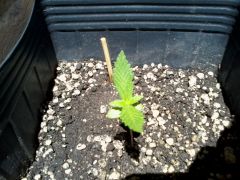-
Total de itens
583 -
Registro em
-
Última visita
Tipo de Conteúdo
Perfis
Fóruns
Galeria
Tudo que Praiero Hemp postou
-
Qtos anos tu tem?.... melhor coisa...vai no médico brow!!! sorte aí...
-

Alguém Sabe Onde Encontro Ez Pipe No Brasil?
topic respondeu ao pgb3025342 de Praiero Hemp em Artes, Filosofia, etc
Boa Lost....simples assim....kkkkk Pô velho..parece q o cara se cadastrou só pra pra perguntar isso...kkkkkk... -
Marrom...isso sempre vai acontecer com as hermas, elas vão sim se autopolinizar... E quando isso acontece, a planta muda seu metabolismo....ela pára de produzir resina, pra começa a "fabricar" as sementes.... Por isso, não espere uma boa lombra de uma herma....até vai dar uns buds, dependendo do nível de hermafroditismo...mas ainda assim, com várias sementes e baixos níveis de THC....
-

Legalização Americana Pode Causar Efeito Bola De Neve Na América Latina.
topic respondeu ao Praiero Hemp de Praiero Hemp em Notícias
Valeu a tradução mano!!..... Dessa notícia eu gostei mais do q da última q postei...kkkkkkk..... o caldo tá engrossando..... -

A Vitória Da Legalização Nos Eua Pode Ter Curta Duração.
topic respondeu ao Praiero Hemp de Praiero Hemp em Notícias
Valeu a força OMASSA!... Ainda rola Crazy.....o pior é q são leis estaduais que permitem...aí vem os federais do DEA e grampeia todo mundo..... phoda.... -

Legalização Americana Pode Causar Efeito Bola De Neve Na América Latina.
um tópico no fórum postou Praiero Hemp Notícias
U.S. marijuana vote may have snowball effect in Latin America One expert said that if U.S. states such as Colorado and Washington could permit a system for consumption of marijuana that didn't cause usage to soar, "it could mark a snowball effect on Latin America." MEXICO CITY — Voters in Colorado and Washington state who approved the recreational use of marijuana Tuesday sent a salvo from the ballot box that will ricochet around Latin America, a region that's faced decades of bloodshed from the U.S.-led war on drugs. Experts said the moves were likely to give momentum to countries such as Uruguay that are marching toward legalization, to undercut Mexican criminal gangs and to embolden those who demand greater debate about how to combat illegal substances. "The trend is toward legalization," said Jorge Castaneda, a former Mexican foreign minister who's an advocate for decriminalization. The decision by voters in Colorado and Washington to legalize marijuana for recreational use puts those states — the first to approve outright legalization — at loggerheads not only with the federal government but also with global treaties that label marijuana a controlled substance. U.S. diplomats in Latin America said Wednesday that President Obama would hold firm against efforts to soften drug laws. "The government of my president is totally against any initiative that weakens rules or laws on the sale or offering of illegal drugs," P. Michael McKinley, the U.S. ambassador to Colombia, told Caracol Radio there. Uruguay, a small South American nation led by a former leftist guerrilla, has moved ahead since August on a proposal to legalize marijuana under a government monopoly. "Chile also has a bill before its Congress. I'm guessing that Argentina may also follow suit. This will go from south to north," Hope said. He added, however, that change would come over years, not months. "We need to tamp down some of the expectations. None of this will happen quickly," he said. Castaneda concurred, saying marijuana legalization remains "a radioactive issue" and the contours of the debate will change only with time. Experts said nations — or states within nations — couldn't easily buck global treaties that included marijuana as a criminal substance. "It's a direct breach of the 1961 U.N. convention on narcotic drugs," said Martin Jelsma, a Dutch scholar on drug-control laws at the Transnational Institute, a center in the Netherlands that advocates for less punitive global-drug policies. Jelsma said nations and states "will have to find a way to reconcile" their laws with the global treaty, which has some 190 signatories. Some may choose to follow the path of Bolivia, which said in the middle of last year that it would withdraw from the convention to protest the U.N. classification of coca leaf as an illegal substance. Many indigenous people in the Andes chew coca leaf as a medicinal and social practice. Jelsma said that if U.S. states such as Colorado and Washington could impose a regime of control on marijuana that didn't cause usage to soar, "it could mark a snowball effect on Latin America." Among those unhappy with moves to legalize marijuana are likely to be Mexican organized-crime groups, which earn billions of dollars a year smuggling pot to the United States. A study published last month by the Mexican Institute for Competitiveness, a nonpartisan-research center that examines the effects of globalization, said that as much as a third of crime groups' revenue came from smuggling pot. Hope, a co-author of the study, said crime groups, particularly the powerful Sinaloa Cartel, could "lose 24 percent of their gross-export revenues" as U.S. states softened laws on marijuana. "This would reshape the Mexican criminal underworld in interesting ways," he said, including slashing the number of jobs involved in smuggling an estimated 2,000 tons of marijuana northward each year. http://seattletimes.com/html/nationworld/2019631247_elxnpotlatin08.html?prmid=head_main#.UJvn3cXYZzU.facebook Aí sim....estamos no caminho certo!! -

A Vitória Da Legalização Nos Eua Pode Ter Curta Duração.
um tópico no fórum postou Praiero Hemp Notícias
Marijuana legalization victories could be short-lived (Reuters) - Votes making Colorado and Washington the first U.S. states to legalize marijuana for recreational use could be short-lived victories for pot backers because the federal government will fight them, two former U.S. drug control officials said on Wednesday. They said the federal government could sue to block parts of the measures or send threatening letters to marijuana shops, followed up by street-level clampdowns similar to those targeting medical marijuana dispensaries the government suspects are fronts for drug traffickers. "This is a symbolic victory for (legalization) advocates, but it will be short-lived," Kevin Sabet, a former adviser to the Obama administration's drug czar, told reporters. "They are facing an uphill battle with implementing this, in the face of ... presidential opposition and in the face of federal enforcement opposition," Sabet said. Colorado and Washington state legalized the possession and sale of marijuana for adult recreational use on Tuesday through ballot measures in defiance of federal law, while a similar initiative was defeated at the polls in Oregon. The initiatives appeared to reflect growing national support for liberalized marijuana laws, as indicated by a Gallup poll last year that found 50 percent of Americans favored making it legal, versus 46 percent opposed. The U.S. Department of Justice, which considers marijuana an illegal drug liable to being abused, said enforcement of the federal Controlled Substances Act "remains unchanged." "We are reviewing the ballot initiatives and have no additional comment at this time," a government statement said. Sabet said he expected the Obama administration would at some point file a federal lawsuit to challenge and seek to block aspects of state-level legalization measures and that this "is going to be caught up in the courts for quite a while." HARD TO ROLL BACK CLOCK But federal action was not expected to snuff out state-sanctioned marijuana in those states - especially the ability of individuals to possess an ounce or less of the drug without risk of arrest by local police. Sabet, who opposes legalization, acknowledged that states were free to eliminate their own penalties for possession. But he said U.S. Attorneys could send letters to Colorado and Washington governors warning them not to implement provisions to regulate and tax marijuana at special stores. Or the federal government could wait until such a system is created and sue to block it, he said. Colorado Governor John Hickenlooper, a Democrat, had said he personally opposed his state's legalization measure. But he has since said he plans to respect the will of voters. In Washington state, Democratic gubernatorial candidate Jay Inslee, who was leading in the vote count in a tight race, has spoken out against his state's initiative but is committed to implementing it, campaign spokeswoman Jaime Smith said. If the Obama administration reacts too harshly, it could suffer politically with younger, more left-leaning voters who chose legalization and typically lean Democratic. But President Barack Obama also faces pressure from anti-drug groups to protect young people from harm they say would result if states set up a regulated and taxed marijuana trade. Robert DuPont, who served as drug czar for former Presidents Richard Nixon and Gerald Ford and opposes legalization, said he welcomed a confrontation. "I think it's time to resolve it," he said. Ian Millhiser, senior constitutional policy analyst with the left-leaning Center for American Progress, said the federal government, even if it sues to challenge the Colorado and Washington initiatives, cannot force police in those states to arrest people for marijuana infractions. "If I were Barack Obama, I would look at this and say I would rather have young voters with me," Millhiser said. (Additional reporting by Jonathan Kaminsky in Olympia; Editing by Cynthia Johnston and Jim Loney) http://www.reuters.c...121108?irpc=932 Mal foi aprovada e tão querendo sacanear.....proibicionistas malditos!!!.... -
Tão enviando já??? to na ansiedade....kkkkkkkk
- 220 replies
-
- revista
- semsemente
- (e %d mais)
-
2x........agiliza a 3ª pra esse ano ainda, pela mor heim.....kkkkkkkkkkkkkk q nada, to zuando...Parabéns pelo trampo....
- 220 replies
-
- revista
- semsemente
- (e %d mais)
-

Holanda Abandona Idéia De Proibir Venda De Maconha Para Turistas
topic respondeu ao urubuz de Praiero Hemp em Notícias
certeza q não ia durar mto.... massa... -
kkkkkkkkkkkkkkkkkkkk posta ela aqui né loko... http://www.growroom.net/board/topic/27981-tutorial-para-enviar-imagens/
-
"Corrija um sábio, e o fará mais sábio ainda. Corrija um tolo, e o fará teu inimigo."
-

Debate Sobre Drogas No Novo Código Penal Movimenta Brasília
topic respondeu ao CannaCerrado de Praiero Hemp em Galeria de Vídeos
Mto bom.... :emoticon-0137-clapping:













